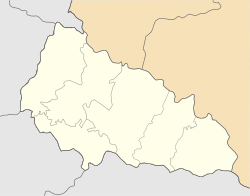This article needs additional citations for verification. (January 2023) |
Mukachevo
Мукачево Munkács | |
|---|---|
| |
| Coordinates: 48°27′00″N 22°45′00″E / 48.45000°N 22.75000°E | |
| Country | |
| Oblast | Zakarpattia Oblast |
| Raion | Mukachevo Raion |
| Hromada | Mukachevo urban hromada |
| Founded | 896 |
| Government | |
| • Mayor | Andriy Baloha[1][2] |
| Area | |
| • Land | 27.9 km2 (10.8 sq mi) |
| Elevation | 125 m (410 ft) |
| Population (2022) | |
• Total | 85,569 |
| • Density | 3,187/km2 (8,250/sq mi) |
| Time zone | UTC+1 (CET) |
| • Summer (DST) | UTC+2 (CEST) |
| Postal code | 89600 |
| Area code | +380 3131 |
| Climate | Cfb |
| Website | Mukachevo City Council |
Mukachevo (Ukrainian: Мукачево, IPA: [mʊˈkɑtʃewo] ; Hungarian: Munkács, IPA: [ˈmuŋkaːtʃ]; see name section) is a city in Zakarpattia Oblast, western Ukraine. It is situated in the valley of the Latorica River and serves as the administrative center of Mukachevo Raion. The city is a rail terminus and highway junction, and has beer, wine, tobacco, food, textile, timber, and furniture industries. During the Cold War, it was home to Mukachevo air base and a radar station.
Mukachevo lies close to the borders of four neighbouring countries: Poland, Slovakia, Hungary, and Romania. Today, the population is 85,569 (2022 estimate).[3] The city is a traditional stronghold of the Rusyn language, and the population of Mukachevo is officially reported as 77.1% ethnic Ukrainian.[4] There are also significant minorities of: Russians (9.0%); Hungarians (8.5%); Germans (1.9%); and Roma (1.4%).[4]
While Uzhhorod is the main administrative city in the region, Mukachevo is a historic spiritual center of the region and center of the former Eastern Orthodox eparchy of Kyivan Metropolis. In 17th century it united with Catholic church by the Union of Uzhhorod, similar to the Union of Brest. Up until World War II and the Holocaust, Mukachevo was primarily a Jewish town, and half the population was Jewish (see below), the rest of the population being Russians, Hungarians, Slovaks, and other minorities. Formerly in Czechoslovakia, and before that in Hungary, it was incorporated into Soviet Ukraine after World War II.
- ^ "In Ukraine, local elections legitimise a new political system - and the old faces behind it". www.opendemocracy.net. openDemocracy. 13 November 2020. Retrieved 7 June 2021.
- ^ "Andriy Baloha wins Mukachevo mayoral election at first round". Interfax Ukraine.
- ^ Чисельність наявного населення України на 1 січня 2022 [Number of Present Population of Ukraine, as of January 1, 2022] (PDF) (in Ukrainian and English). Kyiv: State Statistics Service of Ukraine. Archived (PDF) from the original on 4 July 2022.
- ^ a b Ukraine Census Archived 2009-04-30 at the Wayback Machine










